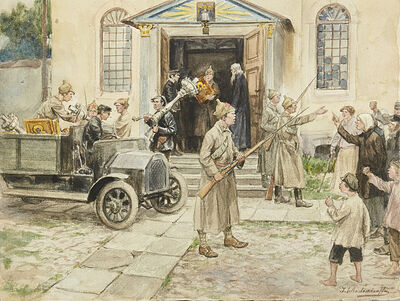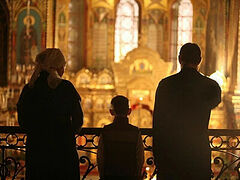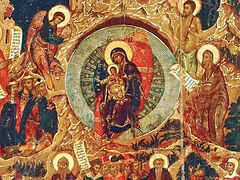The family and the government. Cosmopolitanism and its one-sidedness. Patriotism in the Old and New Testaments. The examples of Moses, Apostle Paul and the Savior Himself. The lawfulness of loving your brother.
A healthy and firm family is the first and main unit of Society and government. The strongest and most organized government is brought to collapse and destroyed if the family unit is corrupted if there is no stable basis in family life and education. On the contrary, if the family is strong and its education is based on healthy beginnings, then even during great external destruction of the form of government life, the nation remains capable of living and restoring governmental might and unity.
We must remember that a Christian family must not wholly be locked up within itself, turning into a “chicken house”. Such life is the life of family egotism. Man, living such a life, does not have any interests outside his family, does not wish to know anything about the joys and griefs of the surrounding world and does not serve it in any way. Of course, such life is not a Christian life, and such a family is not a Christian family. As has been mentioned already, the Christian family is precisely the cell of society, a part indissolubly tied to the whole. It partakes energetically in social life serving its neighbors, constantly taking interest in them, and giving them as much assistance as it can,
However, that also is not sufficient. According to the clear teaching of the New Testament, a Christian’s roles in life must be neither locked within the boundaries of his family nor within the national, native, governmental framework. No, in its love, Christianity is international. For a Christian, every person regardless to which nation he belongs is his brother, whom he must love according to the Commandment of His Savior. This is clearly stated in the sermon about the merciful Samaritan especially the categorical conclusion. In this sermon, the Savior indicated to the Hebrew Advocate with what mercy and love the kind Samaritan regarded the chosen and robbed Jew, a member of a nation hostile to the Samaritans. Further, He said to the Advocate to “go and do the same”. Such is the law of Christian love!
But if we as Christians are called towards such a universal love, is not the Cosmopolitan right. teaching about the brotherhood of all nations where man is a “citizen of the universe” and not of his own government? According to this teaching, mankind must not have any governmental, national distinctions and divisions but it must represent itself as one family.
Undoubtedly, in the positive aspects of its teaching, Cosmopolitanism closely resembles Christianity, and again, it is undoubtedly true that its calls for brotherhood, love, and mutual help were taken precisely from Christianity. These summonses are purely Christian. But only these Christian ideas are valuable in Cosmopolitanism. However, with this truth are mixed many more ugly fallacies and delusions, by Cosmopolitanism. Thanks to this, its teaching turns out to be narrowly one-sided and artificial, and thus not vital. All the conclusions of Cosmopolitanism against the feeling of patriotism are against the Orthodox teaching of the debt of serving the fatherland for its good and security. How continuously harsh and incapable of loving, sharing relationships in life are the longwinded proponents of Cosmopolitanism. They shout, foaming at the mouth, about their love towards mankind and are unable to love their brothers as they should. To love their means to love every man put in their path by God’s Providence, often someone needing, sympathy and support. Christianity does not have this false one-sidedness of Cosmopolitanism. Christ commanded not an artificial love for Mankind but precisely a love for our brothers. For a Christian such brothers are, as a rule, every person (thus a Christian must love everyone), and partially, every person whom he encounters in daily life. Christian love is expressed most of ail precisely in those personal encounters, in vital reciprocal relationships, mutual support and sympathy. How far from this is one-sided Cosmopolitanism with its artificial, severed from life, summons towards love for “mankind”!
When man is still a child in his childhood years, the closest people to him are his parents, brothers and sisters, and in general his relatives. At this time, it is fully sufficient and beneficial for him if he will be good, loving responsive and devoted member of the family. Apparently, the concepts of love for other people not entering into his family are not accessible to the child. He does not have any real relationships with them and they are “strangers” for him. Gradually growing up, he develops personal, live relationships with many other people in the juvenile and youthful years, they become ‘his own” for him. Here, a good education must teach a child to behave as a Christian to these new for him “brothers”, with friendship, well- wishing, with a sincere readiness to help, to show as much assistance as possible. (Of course, the closest brothers for him remain as before his relatives). But here, the juvenile is not yet developed in his spiritual horizon to the extent that from him can be demanded the same loving relationships from the heart with the inhabitants of other nations and countries. Only when a Christian becomes an adult and fully mature person does his horizon open expansively and “his brother” becomes any man, regardless of the nation he belongs to. First and foremost, of course, he loves his family, his relatives among whom he grew up and lived, secondly, the nation to which he belongs. He is tied to his nation with all his governmental, political, and citizen’s responsibilities. The culture, customs, all the distinguishing traits of his native people, especially all that is sacred, are also for him “his own” family; he has a bond with his people, his nation, he loves them, and this love for his nation is Christian patriotism, which the Cosmopolitans in their delusions struggle so fiercely against.
Of course, Christian patriotism is estranged from those extremes and fallacies into which people who call themselves “patriots” so often fall. A Christian patriot, who loves his people, does not close his eyes to their deficiencies and soberly looks at his national character and inherent traits. Thus, he will never agree with those “patriots” who are inclined to elevate everything native (even national bad habits and deficiencies—drunkenness, quarrelsomeness, so on) and consider them lawful and good. They do not notice that this is not patriotism but an inflated national pride; that is, that sin against which Christianity so strongly struggles. No genuine patriot closes his eyes on the sins and maladies of his people—he sees them, grieves over them, struggles with them, and repents before God and other people for himself and his people. Besides this, Christian patriotism is completely estranged from hatred towards other people. If I love my people, why must I not love China, Turkey, or any other country and people (even the Jews)? This would be an Unchristian feeling. No, may God give them also happiness and success, for all of us are people, the children of one Father,
The main facts in favor of patriotism can be found in the Holy Scriptures. In the Old Testament, the entire history of the Jewish people is filled with witnesses of how the Jews loved Sion, their Jerusalem their temple. This was the best example of true patriotism, love, for their nation and its sanctity. It is not in vain that our Christian Church took into its divine services (although in a Somewhat different Christian understanding) this glorification of the Jews of their holy places, singing, “Blessed is the Lord from Sion, Who dwells in Jerusalem. Alleluia”. An especially amazing example of love to its people is shown in the Old Testament by Prophet Moses. At one time, right after the conclusion of the testament with God, the Israeli nation betrayed its God and paid reverence to the golden calf. The wrath of God’s truth became strongly inflamed. Moses began to pray for the sinning people without leaving the mountain on which he prayed for forty days and forty nights. The Lord answered, “Let Me alone that My wrath may wax hot against them and I may consume them.” What is amazing in these words of God is the testimony of the power of prayer of one virtuous man, who, according to St. John Chrysostom’s bold expression, restrains God. The great prophet prayed even more fervently and finally cried out, “forgive them their sins, and If not, blot me, I pray, out of Thy book which Thou hast written”; and “The Lord listened to him this time and did not wish to destroy them”, says the Holy Bible. Is this not the highest podvig of self-sacrificing patriotism?
A similar example from the New Testament can be seen in the life of the great Apostle Paul. No one hindered his work of preaching so spitefully and stubbornly as his compatriots, who did not believe in Christ. They hated Paul, considering him a traitor to the faith of his fathers. What did the Apostle say about his compatriots? He said, “I could wish that myself were to be removed accursed from Christ for my brethren, my kinsmen according to the flesh, who are Israelites” (Rom. 9:3). From these words we can see his love for his native people. This love was so great, that he, like Moses, was ready to sacrifice his personal eternal salvation (not only his temporary life) for the salvation of these people.
There is also the example of the Savior Himself. In the New Testament we read how He said that He came first of all to His people. In another instance He, turning to Jerusalem, said, Jerusalem, Jerusalem, which killest the prophets, and stonest them that are sent unto thee… (Lk. 13:34). When He rode Into Jerusalem as people cried “Hosannah” to Him, but several days later would shout, “Crucify Him, Crucify Him”. He loved His own people with a touching, deep love.
Thus, neither the feeling of patriotism, nor the lawful universal love for one’s family and neighbor’s should be rejected or condemned—contrary to the false views of Cosmopolitanism. We already know the Apostles words, “If any provide not for his own, and especially for those of his own house, he hath denied the faith, and is worse than an infidel” (1 Tim. 5:8). In another place, speaking about choosing someone to serve the Church, the Apostle establishes conditions that the chosen one “should govern his children and house well”. And we are emphasizing again that such love and care must not be egotistical or self-centered. No, caring for those who come in contact with him in life, a Christian must forget other people in his Christian love, his neighbors and brothers in Christ… In conclusion, let us cite the words of Apostle Paul from the Epistle to the Galatians, “As we have therefore opportunity, let us do good unto all men, especially unto them who are of the household of faith” (Gal. 6:10).







